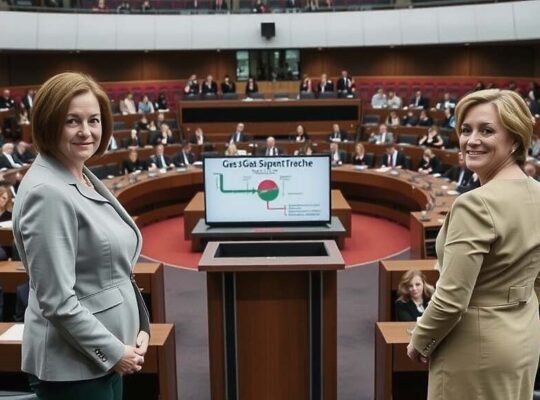The intensifying pension dispute has spurred Germany’s Left Party to unveil a comprehensive pension proposal, arguing it’s the only viable path to preserving the statutory pension system. Left Party leader Ines Schwerdtner positioned the initiative, slated to be presented as a motion in the Bundestag, as a direct challenge to the conservative Union’s austerity-driven agenda. “Breaking the mantra of austerity is paramount” the party asserted, aiming to resonate with social organizations, trade unions and a broad swathe of workers.
The Left’s plan reaffirms its demand to elevate the pension level to 53 percent, a figure the party insists is readily achievable. Pension policy expert Sarah Vollath contends that the nation’s increasing wealth and productivity readily facilitate this increase. However, this assertion is met with sharp criticism from Guido K. Raddatz of the Foundation for Market Economy, who warns the measures would significantly heighten the burden on employed individuals, businesses and taxpayers.
Central to the Left’s strategy is a call to significantly increase employer contributions. To finance the proposed 53% pension level, the party argues for an increase in contribution rates of 2.44 percentage points, a model they point to Austria’s system where employers contribute a higher proportion. Furthermore, the party proposes a redistribution of pension benefits amongst recipients, advocating for a doubling of assessment limits and subsequent leveling of higher pension claims above a threshold of €3,671.10, impacting a relatively small number of recipients while aiming to bolster pensions for those currently earning below €1,500.
The proposal extends to a wider spectrum of income sources, mandating pension contributions for all earned income, encompassing self-employed individuals, civil servants and members of parliament. The Left claims this expansion would provide medium-term stability to the statutory pension insurance. However, Raddatz dismissed this approach, asserting it fails to address the underlying demographic challenges and would ultimately shift the responsibility for accruing liabilities onto the working population. The fundamental issue, he argues, remains rooted in demographic trends and expanding the insured base will not resolve it; it will only create further long-term obligations.
The Left’s proposal represents a stark ideological contrast within the ongoing debate, highlighting the diverging perspectives on how to safeguard the future of Germany’s pension system. The plan’s immediate impact will largely depend on its reception within the Bundestag and the broader political landscape.












